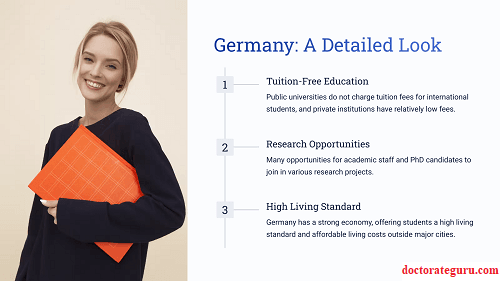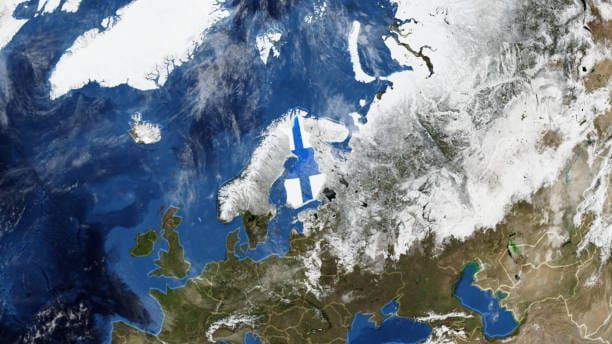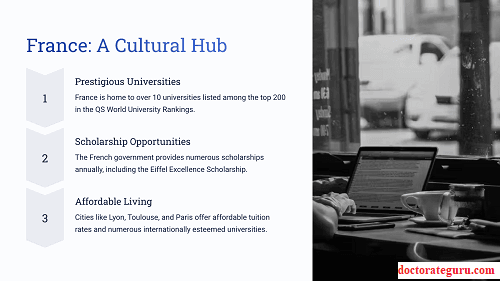Many candidates, after their master’s, have the dream of obtaining a PhD, but feel weighed down by the looming financial burden. The high cost of obtaining a PhD abroad as an international student has been the major reason why this dream is cut short prematurely. According to the Education Data Initiative, the average PhD graduate carries $89,526 in student debt upon completion, a burden that can take decades to repay.
This overwhelming figure prompts many international students to question whether a doctoral degree is within their reach. For many international students, high tuition fees and living costs create sleepless nights of worry and force compromises on research focus. But what if there were alternatives that allowed you to earn your doctorate without sinking into financial chaos?
Imagine conducting groundbreaking research in a country renowned for its academic excellence, all while enjoying reduced or zero tuition costs without tuition bills draining your savings. This isn’t just wishful thinking; numerous nations now offer incredibly affordable or even tuition-free PhD programs specifically designed for international students.
In this post, we will explore the “Top 10 Cheapest PhD Programs for International Students.” We’ll break down our selection criteria to help you make informed decisions about your education.
Criteria for Selection
The selection criteria for identifying the most affordable PhD programs for international students are broad. Several key criteria must be considered to ensure that the programs offer both academic quality and affordability. These criteria include, but are not limited to, the following:
Tuition vs. Administrative Fees
The tuition fees and administrative fees are key factors you need to put in place to determine what the total cost of getting a PhD really is. Many universities advertise low tuition rates, but these figures often apply only to in-state students, which can lead to potential misunderstandings. The total cost of attendance can increase significantly when factoring in administrative fees, which include registration, activity, and health charges.
Funding & Stipend Opportunities
Another factor considered in formulating this list of affordable PhD programs for international students is funding and stipend opportunities, as they significantly impact the overall cost of pursuing doctoral education. Programs offering competitive stipends and financial support are less expensive and become more appealing, as they can alleviate some of the financial stresses associated with higher education.
Living‑Cost Considerations
When selecting affordable PhD programs, the living costs associated with each program play a crucial role. International students should evaluate the university’s location, as housing expenses can significantly impact their overall financial demands. Understanding the disparity between stipends and local living costs is crucial, as housing typically accounts for a substantial portion of a student’s budget.
Research Facilities & Career Prospects
Another factor considered before compiling this list is the availability and quality of research facilities. The combination of robust research resources and favourable career opportunities makes certain countries or programs more appealing for students looking to minimise costs while maximising potential benefits.
Top 10 Cheapest PhD Programs for International Students
#1. Germany: Tuition‑Free Doctorate with Modest Semester Fees

On average, living expenses in Germany are approximately €800 per month, covering essentials like housing, food, and transportation. Students can also access funding opportunities; the DAAD provides stipends of around €1,200 per month, and many universities offer assistantship positions, which further support students financially.
Language barriers are often minimised, as many structured doctoral programs are delivered in English and French, although some research roles may require proficiency in German. The unique combination of zero tuition, high-quality laboratories, and a broad selection of universities, such as TU Munich, LMU, and Heidelberg, enhances the appeal of pursuing a doctorate in Germany.
However, prospective students should be aware of the competitive nature of these programs and the varying living costs across different cities. Overall, Germany’s doctoral programs offer an exceptional opportunity for international students seeking a world-class education at a minimal expense.
#2. Norway: Tuition‑Free PhD and Employed as Academic Staff

Pursuing a PhD in Norway presents a unique opportunity for international students, as the program is tuition-free. Students only need to pay a semester fee ranging from NOK 600 to 1,000, which is approximately €55 to €95. In addition to the free education, PhD candidates are employed as academic staff, receiving a monthly salary that helps cover their living expenses.
While the required proof of funds for living in Norway is about NOK 13,790 per month, the university salary helps manage these costs effectively. Most PhD programs are taught in English, although some teaching roles may require proficiency in Norwegian.
Notably, PhD positions are viewed as employment opportunities that come with benefits, including vacation days and pension contributions. The system encourages research investment, allowing PhD students to focus on their studies while receiving financial support.
Although living costs in Norway can be high and the climate may be challenging for some, the overall package makes it one of the most affordable and attractive options for pursuing a doctorate.
#3. Finland: Zero Fees for Doctoral Studies
Finland stands out as one of the most affordable destinations for international students seeking doctoral studies, offering a tuition-free PhD program that costs nothing yearly. Known for its commitment to educational excellence, the country provides an enriching environment for academic growth and research. While living expenses range from approximately €700 to €1,100 per month, depending on the city, many students can alleviate costs through competitive university scholarships and salaried research positions.

An illustrative stock image showcasing the distinctive tricolor flag of Finland beautifully draped across a detailed map of the country, symbolizing the rich history and culture
Most doctoral programs are conducted in English, particularly in technical fields. While knowledge of Finnish or Swedish can be advantageous, it is not mandatory. Finland’s unique educational approach lies in its emphasis on interdisciplinary research, fostering collaboration across various fields. This contributes to a high quality of life, making it an attractive option for international students.
While it is essential to consider the competitive nature of university scholarships and the long winters that may affect some students’ experiences, Finland offers an exceptional opportunity for those seeking to pursue a PhD without tuition fees. A supportive academic community and a vibrant cultural landscape complement this opportunity.
#4. Sweden: No Tuition & Monthly Salary
Sweden stands out as an attractive destination for international students pursuing a PhD, primarily due to its unique approach to doctoral education. In Sweden, applying for a PhD position is similar to applying for a job, which means candidates receive a monthly salary rather than paying tuition.
PhD candidates earn a gross salary of approximately SEK 30,000 per month (approximately €2,600), and living expenses typically range from SEK 12,000 to 15,000 after tax. This model not only alleviates financial burdens but also ensures that PhD candidates enjoy benefits and social security, reinforcing the employment aspect of their positions.
While the country emphasises English for research and teaching, some roles may require knowledge of Swedish. Although high taxation and living costs in major cities like Stockholm can be a concern, many other cities in Sweden offer a more manageable cost of living.
#5. France: Symbolic Doctoral Registration Fee
France offers a remarkably low doctoral registration fee of just €391 per year for students enrolled in public universities, making it one of the most affordable options for international PhD candidates. This nominal fee allows students to access a wealth of resources, including the vast network of CNRS institutes and the prestigious Grandes Écoles research facilities.
While living expenses can range from €800 to €1,200 per month, depending on the city, financial support is available through various fellowships, including those from CNRS and Erasmus+ grants. While proficiency in French can be beneficial, many research labs welcome English-speaking students, broadening the opportunities for international scholars. Access to different research networks and a vibrant cultural environment adds to the appeal of pursuing a PhD in France.
Potential students should be aware of the bureaucratic challenges and language barriers that may arise alongside their academic journey. Concerns surround the employment rights of doctoral students, as they often face a lack of formal contracts. Although the low tuition and rich research opportunities are attractive, candidates must stay informed about their rights and responsibilities as they navigate their PhD experience in France.
#6. Austria: Modest Semester Fees

The country also offers various funding opportunities, including scholarships from the Austrian Science Fund (FWF) and departmental grants to assist students financially. While most programs are conducted in German, many research labs operate in English, providing some flexibility for international students.
Austria serves as a central hub for EU research networks, enhancing accessibility to collaborative projects across Europe. PhD candidates should be aware that a good command of German is essential for administrative tasks, and English-only courses may be limited.
#7. Czech Republic: Free State‑Language PhDs
The Czech Republic presents an attractive option for international students seeking affordable PhD programs, particularly through its public universities. These institutions offer PhD studies in Czech at no tuition fees, with charges only applicable for extended study periods. Living costs in cities like Prague or Brno are relatively low, estimated between €500 and €700 per month.
PhD Students have access to various funding opportunities, including Czech government scholarships and EU-funded projects, which can further alleviate financial burdens. While studying in Czech is mandatory to obtain a free PhD, some programs are available in English, although these may incur fees.
The academic environment in the Czech Republic is vibrant, providing students with a unique cultural experience alongside their studies, although prospective students should be aware of the language requirements and the limited number of English-taught options.
#8. Belgium (University of Antwerp): Two‑Event Fees

Funding opportunities such as BOF-DOCPRO scholarships and institutional grants are available to help offset costs. While many PhD programs are offered in English, students seeking teaching roles may need to demonstrate proficiency in Dutch. This flexibility in research paths makes the university attractive to a diverse group of candidates.
#9. Brazil: Tuition‑Free Public Universities
Brazil stands out as one of the most affordable destinations for international students pursuing a PhD, primarily due to its tuition-free public universities. These institutions charge no tuition fees for doctoral programs, making the financial burden significantly lighter than many countries. The cost of living in Brazil can range from R$2,000 to R$3,000 per month, translating to approximately €360 to €540, depending on the city.
International students can benefit from scholarship opportunities provided by CAPES and CNPq, offering monthly stipends ranging from €500 to €1,000 to help cover living expenses.
While proficiency in Portuguese is often required, some programs are available in English, expanding accessibility for non-Portuguese speakers. Brazil’s public universities have demonstrated impressive growth in research output, enhancing their global reputation and making them increasingly appealing to prospective students.
#10. Argentina: Completely Free Doctorates
Argentina stands out as one of the most affordable options for international students pursuing a PhD, thanks to its comprehensive and free public university system, established in 1949. All state universities charge zero tuition and fees, making higher education accessible to both local and foreign students. Funding opportunities, such as CONICET scholarships and university fellowships, are available to support doctoral candidates financially.
While the vibrant academic culture enhances the research experience, proficiency in Spanish is a requirement, as most programs are taught in this language with limited English options. Students should be aware of the challenges posed by economic volatility in Argentina.
Conclusion
The top 10 most affordable Phd pathways for international students reveal numerous high-quality education opportunities at a budget-friendly price. These programs offer significant value through low or even tuition-free options, allowing students to pursue their academic goals without accumulating daunting debt.
What are your thoughts on these affordable options? Share which country interests you the most in the comments below! Feel free to explore our additional resources on scholarship tips and cost-saving strategies, and please share this post on LinkedIn or Twitter to help fellow PhD aspirants uncover these valuable opportunities.








3 comments
Wow wonderful blog layout How long have you been blogging for you make blogging look easy The overall look of your site is great as well as the content
For the reason that the admin of this site is working, no uncertainty very quickly it will be renowned, due to its quality contents.
Your blog is a breath of fresh air in the often stagnant world of online content. Your thoughtful analysis and insightful commentary never fail to leave a lasting impression. Thank you for sharing your wisdom with us.